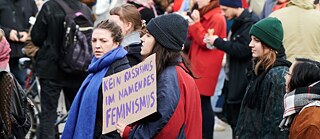Our new columnist Magrita Tsomou views Berlin from a queer feminist perspective. Her latest observation is the emancipatory power that comes when normality ends.
It’s always a particular delight in the summertime when the warm weather drives all the city’s diverse groups outside, and the sense that any body and anyone can simply be whoever they are becomes more acute with every hour of sunshine. Everything feels even more intensive this year, however. The corona crisis has made me more vulnerable, indeed more sensitive – I find it uplifting to spot small groups of people in cafés, bars and parks, slowly daring to be a bit more social again. I notice with appreciation that it is a privilege to collectively experience bodies and to perceive their presence, voices and small gestures in passing.Feminists have always stressed how physicality is of vital importance for the wellbeing of our communities, but this has become especially clear during the pandemic. I had feared that the curfews and confinement would silence our public voices, yet I was pleasantly surprised by the wealth of emancipatory discourse on social media and in the mainstream media.
The vulnerability of bodies, which has long been the subject of queer feminist discourse, is suddenly omnipresent. Now the talk everywhere is of how nursing care seriously needs to be addressed by politicians; how important housework and reproductive labour are, how violence takes place in families of all social strata and how key workers in occupations dominated by women earn the least money. It seems as if corona has heralded in an era in which we will renegotiate what is important for our society.
During this period I and my colleagues have tried to fill the online public sphere that we still have left with debates. For example, I had a conversation with a grande dame of feminism, the Austrian author Marlene Streeruwitz. Her words have now acquired a special urgency: “How do we detach ourselves from an image of women that is still based on the unpaid reproductive labour of women in a small family? How do we defend ourselves against toxic masculinity? As with topics relating to migration, women’s bodies are still implicitly classified as the “others”.”
Gender therefore needs to be redefined – as a movement and as a quest for whatever we could be, above and beyond the projections assigned to us. This view is shared by queer theorist Paul Preciado, whom I interviewed during a HAU online discussion. Preciado writes as a gender dissident. He sees his trans body as being in a transitional state between man and woman. It is precisely this state of transition that he says is a productive means of describing the stories of migration and political transformation that the categories of “patriarchal colonial” capitalism render null and void. In the midst of the pandemic’s dystopia he calls for a physical-political mutation of our own design through which we, the diversity of living bodies, might forge transverse alliances – without the exclusion mechanisms of citizenship and gender allocations.
Since the murder of George Floyd such ideas have also been taking shape as political entities on the streets: Black Lives Matter, Migrantifa, Unteilbar and the Queer Pride Parade – sporting masks, intersectionally heterogeneous groups of young people are demonstrating their belief that race and gender, climate and anti-fascism, migration and queer lifestyles all belong together. So it won’t be just a normal Berlin summer this year – the young activists have no wish to return to normality, as normality was part of the problem.
“Frankly …”
On an alternating basis each week, our “Frankly ...” column series is written by Gerasimos Bekas and Magrita Tsomou, Maximilian Buddenbohm, Qin Liwen and Dominic Otiang’a. In “Frankly ... Berlin”, our columnists throw themselves into the hustle and bustle of the big city on our behalf, reports on life in Berlin and gathers together some everyday observations: on the underground, in the supermarket Frankly … Berlin, in a nightclub.
July 2020
